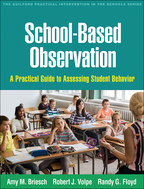School-Based Observation
A Practical Guide to Assessing Student Behavior
Amy M. Briesch, Robert J. Volpe, and Randy G. Floyd
A Paperback Originale-bookprint + e-book
A Paperback Original
orderFebruary 16, 2018
ISBN 9781462533480
Price: $41.00 270 Pages
Size: 8" x 10½"
The reproducible materials can be downloaded and printed in PDF format.
“School-Based Observation: A Practical Guide to Assessing Student Behavior is a comprehensive yet easily accessible text about best practices in conducting direct observations in schools, and it will surely be highlighted and dog-eared and creased from photocopying by many school psychologists for years to come….One of the greatest features of School-Based Observation is its format: The content of each chapter is supplemented by embedded figures and tables, case studies are provided at various points to illustrate the application of concepts, and the appendices contain more than 30 pages of reproducible and printable resources (the observation templates and glossary of operational definitions alone may be worth the price of the book).”

—NASP Communiqué
“Briesch and colleagues do a masterful job of teaching the reader not only what and why, but also how to hone skills to become a good observer. Using multiple examples, the authors cogently describe the advantages of direct observation while acknowledging associated resource demands. Excellent materials are provided to help readers sift through options to make the most of available resources while maintaining high-quality observations. This book is extremely valuable for school personnel who would like fresh insights into use of observation methods. It is a useful text for any course teaching observation knowledge and skills within a problem-solving approach.”

—Sandra M. Chafouleas, PhD, Board of Trustees Distinguished Professor, Neag School of Education, University of Connecticut
“An indispensable resource for school psychologists, social workers, educational consultants, and teachers. This practical guide provides observation tools to assess individual student behavior as well as environmental contexts in which students learn. Case examples are used to illustrate the authors’ approach to effective classroom observation. The tools shared by the authors not only promote objective recording, but also have excellent utility for designing individualized interventions. Containing a limited amount of jargon, the book is very user friendly. It will support the continued professional learning of school-based practitioners to decrease drift and ensure decision making that promotes improved student learning.”

—Dorothy J. Landon, PhD, school psychologist, Heartland Area Education Agency, Johnston, Iowa
“In my 35 years of employing direct observations in classrooms, I have never seen a more comprehensive book that encompasses all the critical ingredients for ensuring that direct observations conducted in school-based settings result in meaningful and valid measurement of behavior. School-based observation is a science and an art. In this book, readers learn how to conduct focused observations that help problem-solve students’ learning needs and inform practice. For anyone who is designing a direct observation system or using an existing system, this book is essential!”

—Maureen A. Conroy, PhD, Anita Zucker Endowed Professor and Professor of Special Education and Early Childhood Studies, University of Florida
“I highly recommend this book for any practicing school psychologist’s reference bookshelf. In a time of growing dedication to data-based decision making, incoming and current school psychologists need to have skills to conduct goal-directed assessments that provide educators with useful results and effective recommendations. We are becoming increasingly reliant on direct observation data to furnish this information. Kudos to the authors for their great job on a staple reference!”

—Cristina Green, EdS, NCSP, school psychologist, Scott County Schools, Georgetown, Kentucky
—NASP Communiqué
“Briesch and colleagues do a masterful job of teaching the reader not only what and why, but also how to hone skills to become a good observer. Using multiple examples, the authors cogently describe the advantages of direct observation while acknowledging associated resource demands. Excellent materials are provided to help readers sift through options to make the most of available resources while maintaining high-quality observations. This book is extremely valuable for school personnel who would like fresh insights into use of observation methods. It is a useful text for any course teaching observation knowledge and skills within a problem-solving approach.”
—Sandra M. Chafouleas, PhD, Board of Trustees Distinguished Professor, Neag School of Education, University of Connecticut
“An indispensable resource for school psychologists, social workers, educational consultants, and teachers. This practical guide provides observation tools to assess individual student behavior as well as environmental contexts in which students learn. Case examples are used to illustrate the authors’ approach to effective classroom observation. The tools shared by the authors not only promote objective recording, but also have excellent utility for designing individualized interventions. Containing a limited amount of jargon, the book is very user friendly. It will support the continued professional learning of school-based practitioners to decrease drift and ensure decision making that promotes improved student learning.”
—Dorothy J. Landon, PhD, school psychologist, Heartland Area Education Agency, Johnston, Iowa
“In my 35 years of employing direct observations in classrooms, I have never seen a more comprehensive book that encompasses all the critical ingredients for ensuring that direct observations conducted in school-based settings result in meaningful and valid measurement of behavior. School-based observation is a science and an art. In this book, readers learn how to conduct focused observations that help problem-solve students’ learning needs and inform practice. For anyone who is designing a direct observation system or using an existing system, this book is essential!”
—Maureen A. Conroy, PhD, Anita Zucker Endowed Professor and Professor of Special Education and Early Childhood Studies, University of Florida
“I highly recommend this book for any practicing school psychologist’s reference bookshelf. In a time of growing dedication to data-based decision making, incoming and current school psychologists need to have skills to conduct goal-directed assessments that provide educators with useful results and effective recommendations. We are becoming increasingly reliant on direct observation data to furnish this information. Kudos to the authors for their great job on a staple reference!”
—Cristina Green, EdS, NCSP, school psychologist, Scott County Schools, Georgetown, Kentucky



